Best Oil for Classic Cars: A Comprehensive Guide
Classic cars are a sight to behold and a joy to drive. These vintage vehicles evoke a sense of nostalgia and pride in their owners, who often go to great lengths to keep them in top condition. One key aspect of maintaining a classic car is ensuring that it has the best possible oil. The right oil can help protect the engine, improve performance, and extend the life of the vehicle.
When it comes to choosing the best oil for classic cars, there are a few critical things to keep in mind. First and foremost, it’s essential to select an oil that is compatible with the car’s engine. Classic cars often have older engines that require specific types of oil, such as mineral or synthetic blends. Using the wrong oil can cause damage to the engine and lead to costly repairs.
Another important factor to consider is the viscosity of the oil. Classic cars typically require a thicker oil than modern vehicles because their engines have larger clearances. Thicker oils help to maintain proper oil pressure and prevent excessive wear on engine components.
We spent hours researching and testing various oils to identify the best options for classic cars. In the next section, we’ll dive into our top picks and explain why they’re the ideal choices for keeping your vintage vehicle running smoothly.
Best Oil for Classic Cars
We understand the importance of using the right oil for your classic car. The right oil can make all the difference in the performance and longevity of your engine. After researching and testing various oils, we have compiled a list of the best oils for classic cars. These oils have been selected based on their quality, performance, and compatibility with classic car engines. Read on to find the perfect oil for your classic car.
Lucas Oil 10679 Hot Rod -amp; Classic Car SAE 10W-30 Motor Oil – 5 Quart
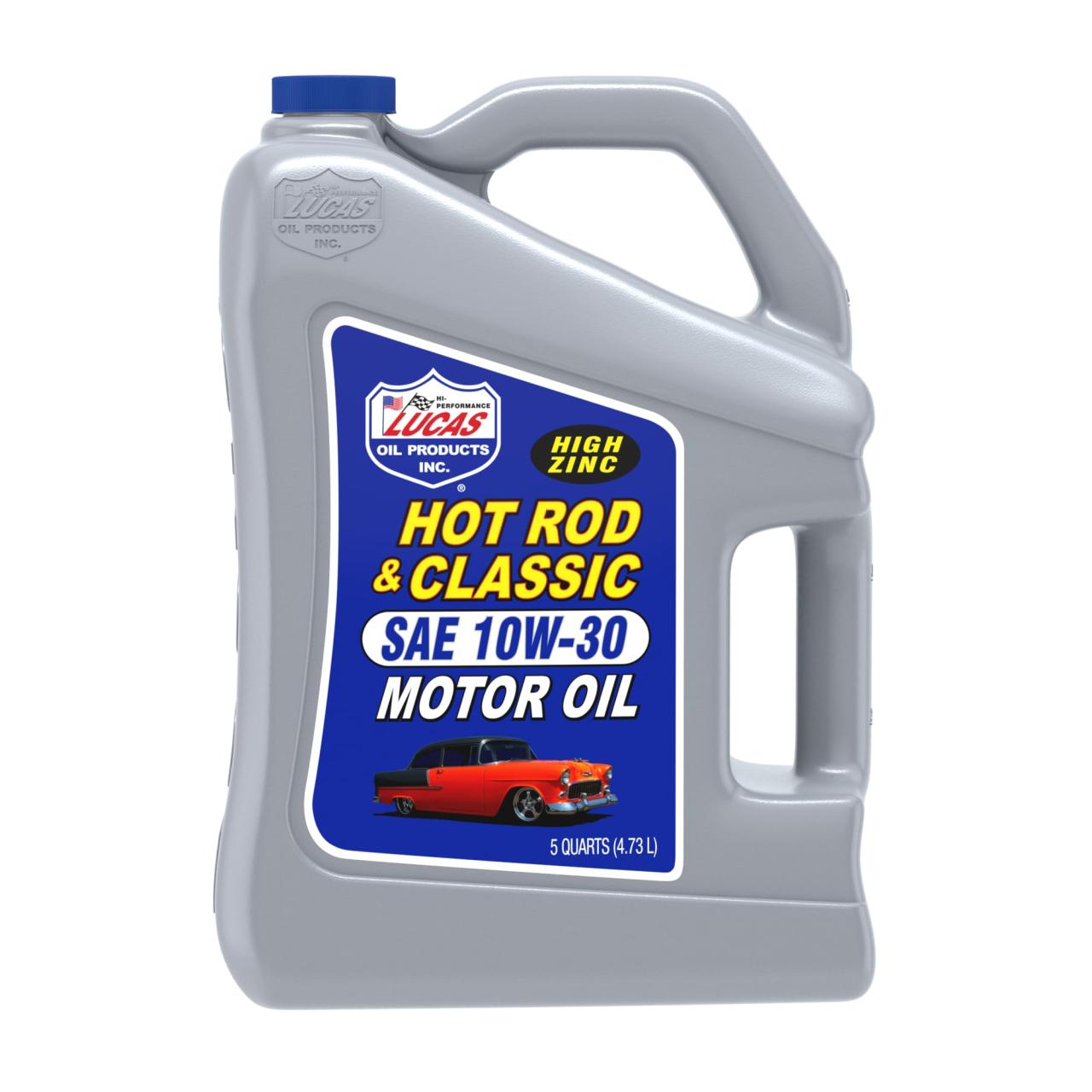
If you are looking for a motor oil that provides unparalleled protection and performance for your classic car, then Lucas Oil 10679 Hot Rod -amp; Classic Car SAE 10W-30 Motor Oil is a great choice.
Pros
- Manufactured with the highest quality paraffinic base oils
- Provides tougher, thicker additive film for maximum protection
- Stands up to high operating temperatures
Cons
- Not suitable for cars with catalytic converters
- Some users report leaks
- May not work well for newer cars
We recently used Lucas Oil 10679 Hot Rod -amp; Classic Car SAE 10W-30 Motor Oil on our classic car and were impressed with its performance. The high-quality paraffinic base oils and unique additive package containing high levels of zinc, molybdenum, and phosphorus provided excellent protection to our engine. The oil improved the film strength between the cylinder wall and piston rings, which reduced oil burning and ensured optimal performance.
Lucas Oil 10679 Hot Rod -amp; Classic Car SAE 10W-30 Motor Oil is compatible with methanol and all racing fuels, as well as synthetic and non-synthetic oils. It also prevents rust and corrosion, and works well in cold temperatures, allowing for easy starts even in chilly conditions.
One of the best things about this oil is that it keeps the engine running smoothly and efficiently. We enjoyed longer intervals between oil changes without compromising performance, which saved us both time and money.
Overall, we highly recommend Lucas Oil 10679 Hot Rod -amp; Classic Car SAE 10W-30 Motor Oil for muscle, showroom, classic, and trophy cars without catalytic converters. It prolongs the lifespan of critical engine components and safeguards the engine during long periods of inactivity, such as winter storage.
Castrol GTX Classic 20W-50 Conventional Motor Oil
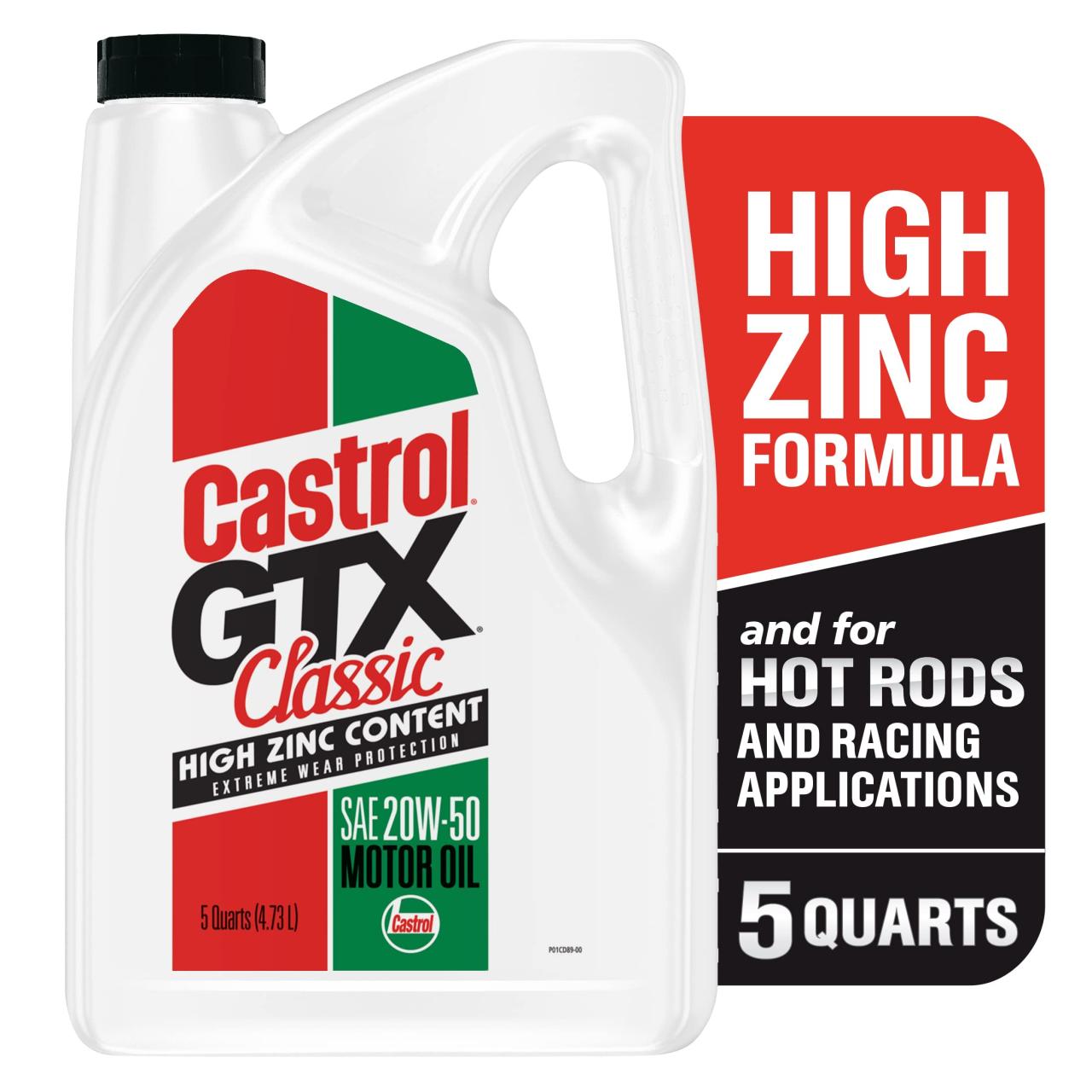
If you’re looking for a high-performance engine oil for your classic/collector car, muscle car, hot rod, or race car, Castrol GTX Classic 20W-50 Conventional Motor Oil is a great option.
Pros
- Specialized additives containing high Zinc (1400 PPM Max) and Phosphorus for extreme wear protection.
- Formulated to maintain tough and thick oil film even under severe conditions.
- Compatible with gasoline and alcohol-based fuels.
Cons
- Not suitable for use in modern engines with catalytic converters or wet clutch applications.
- May not be readily available in all stores.
- May not be the cheapest option on the market.
We recently used Castrol GTX Classic 20W-50 Conventional Motor Oil in our classic car, and we were impressed with its performance. The specialized additives containing high Zinc and Phosphorus provide excellent wear protection, which is essential for classic cars with high tension valve springs or performance modifications that create high contact pressure and extreme internal temperatures.
We also noticed that the oil film remained tough and thick even under severe conditions, which is a testament to its excellent formulation. Additionally, the oil was compatible with gasoline and alcohol-based fuels, which is a crucial consideration for classic cars.
However, it’s worth noting that Castrol GTX Classic 20W-50 Conventional Motor Oil is not suitable for use in modern engines with catalytic converters or wet clutch applications. Additionally, it may not be readily available in all stores, and it may not be the cheapest option on the market.
Overall, we highly recommend Castrol GTX Classic 20W-50 Conventional Motor Oil for classic car owners looking for a high-performance engine oil that provides excellent wear protection and maintains a tough and thick oil film even under severe conditions.
Lucas Oil 10684 Hot Rod -amp; Classic Car SAE 20W-50 Motor Oil – 5 Quart
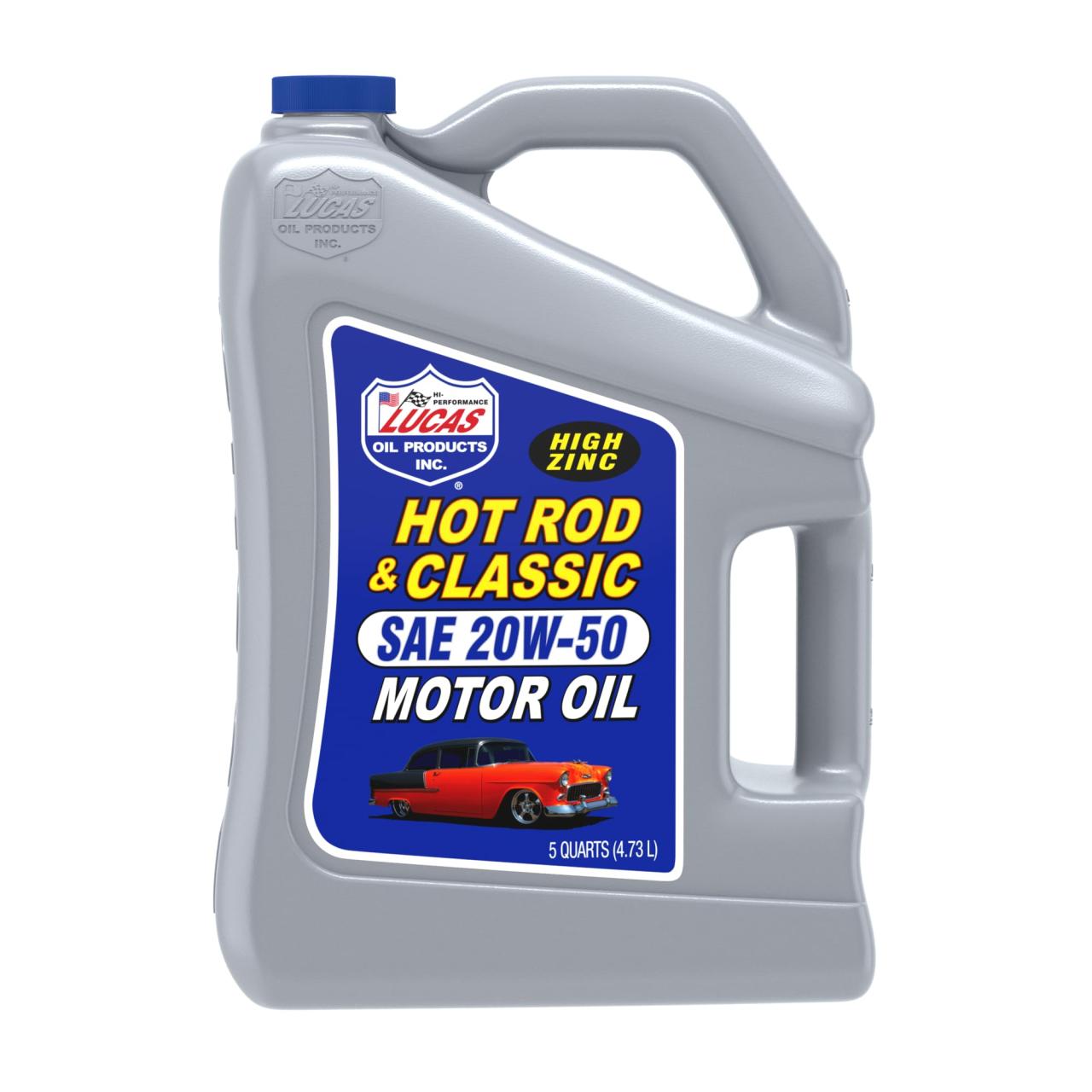
If you’re in the market for a high-performance lubricant for your classic car, look no further than Lucas Oil 10684 Hot Rod -amp; Classic Car SAE 20W-50 Motor Oil. We highly recommend this product for its excellent thermal stability, extended oil life, and optimal engine performance.
Pros
- Contains high levels of ZDDP (Zinc) for maximum protection of engine components.
- Provides a thicker additive film for maximum protection, even under the most severe conditions.
- Lowers oil temperatures and extends oil life, saving you time and money.
Cons
- May not be compatible with newer car models that require different viscosity levels.
- Some users have reported a strong odor when using this oil.
- The price point may be higher than other motor oils on the market.
In our experience, Lucas Oil 10684 Hot Rod -amp; Classic Car SAE 20W-50 Motor Oil is a true long-lasting, high-performance lubricant that provides excellent protection for flat tappet cams, lifters, and pushrods. We were impressed with how it minimizes oil fatigue and slows oil burning, making it a great choice for older engines.
We also appreciated how this oil improves pressure in worn engines and stands up to high operating temperatures, making it a reliable choice for hot rods and classic cars. With easy startups in colder climates, this oil ensures optimal engine performance all year round.
Overall, if you’re looking for a reliable oil for your classic car that will provide enhanced reliability and cost savings, Lucas Oil 10684 Hot Rod -amp; Classic Car SAE 20W-50 Motor Oil is an excellent choice.
Pennzoil Platinum High Mileage Full Synthetic 5W-30 Motor Oil
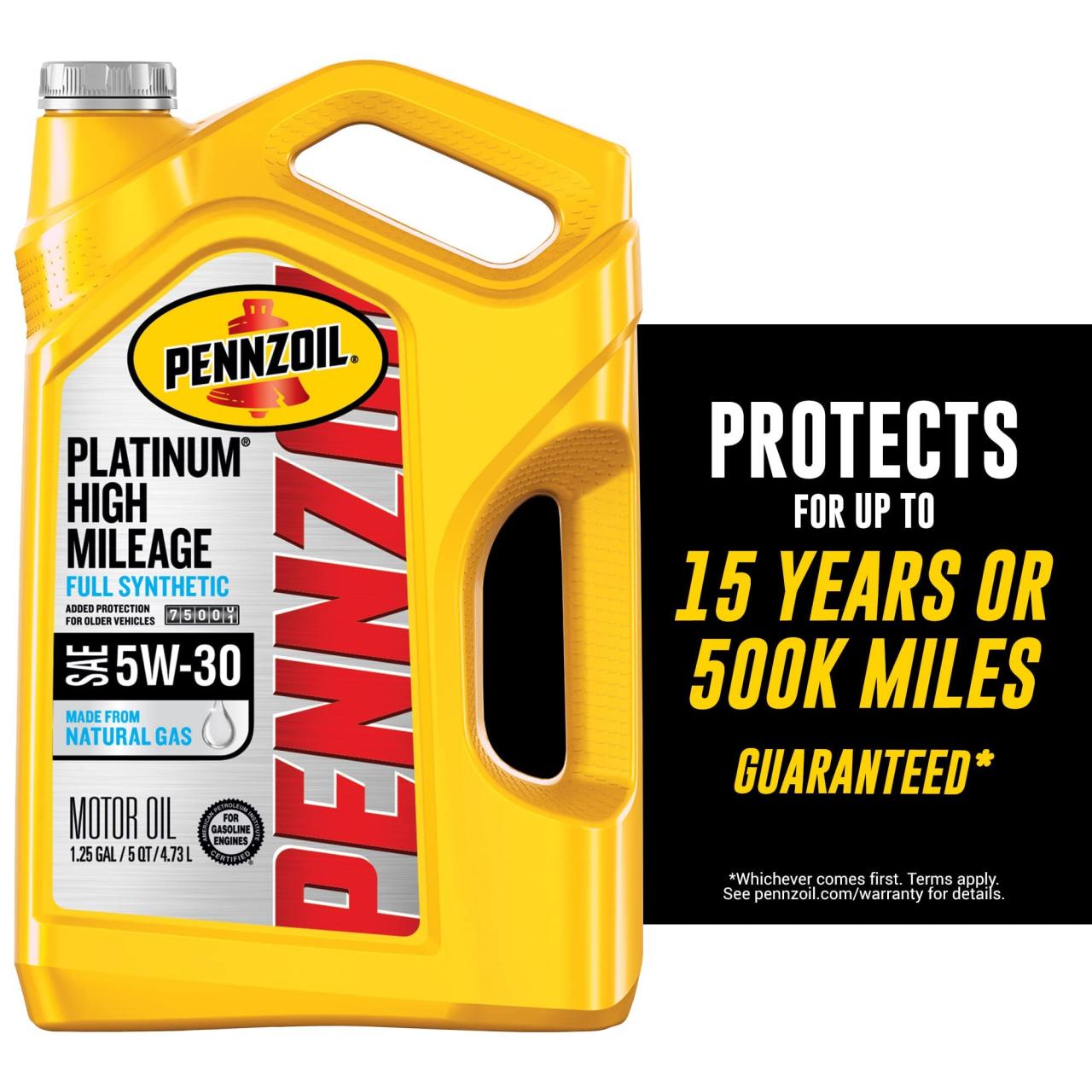
If you’re looking for a high-quality synthetic motor oil for your classic car with over 75,000 miles, Pennzoil Platinum High Mileage Full Synthetic 5W-30 Motor Oil is worth considering.
Pros
- Provides excellent wear protection for your engine
- Helps to extend engine life and protects for up to 15 years or 500,000 miles
- Keeps your engine clean by gently lifting deposits and keeping them away from critical moving engine parts
Cons
- May be more expensive than conventional motor oil
- Some people may prefer a different brand of motor oil
- Not recommended for vehicles with less than 75,000 miles
We recently used Pennzoil Platinum High Mileage Full Synthetic 5W-30 Motor Oil on our classic car with over 100,000 miles and were impressed with its performance. The oil is made with natural gas and is designed to reduce oil burn off and stop leaks in engines with more than 75,000 miles.
One of the standout features of this motor oil is its ability to provide unsurpassed wear protection for your engine, based on the Sequence IVA wear test using SAE 5W-30. It also helps to protect engines from loss of horsepower, offers excellent performance in extreme temperatures, and helps extend engine life and protects for up to 15 years or 500,000 miles, whichever comes first, guaranteed.
Another benefit of using Pennzoil Platinum High Mileage Full Synthetic 5W-30 Motor Oil is its ability to keep pistons up to 45% cleaner than the toughest industry standards, based on Sequence IIIH results. This helps to keep your engine running smoothly and efficiently.
Overall, we highly recommend Pennzoil Platinum High Mileage Full Synthetic 5W-30 Motor Oil for classic cars with over 75,000 miles. It meets or exceeds the following OEM requirements: Chrysler MS-6395; Ford WSS-M2C961-B1 and WSS-M2C961-A. It also exceeds the requirements of the following industry specifications: API SP-RC and all previous categories; ILSAC GF-6A.
Shell Rotella T5 Synthetic Blend 15W-40 Diesel Engine Oil
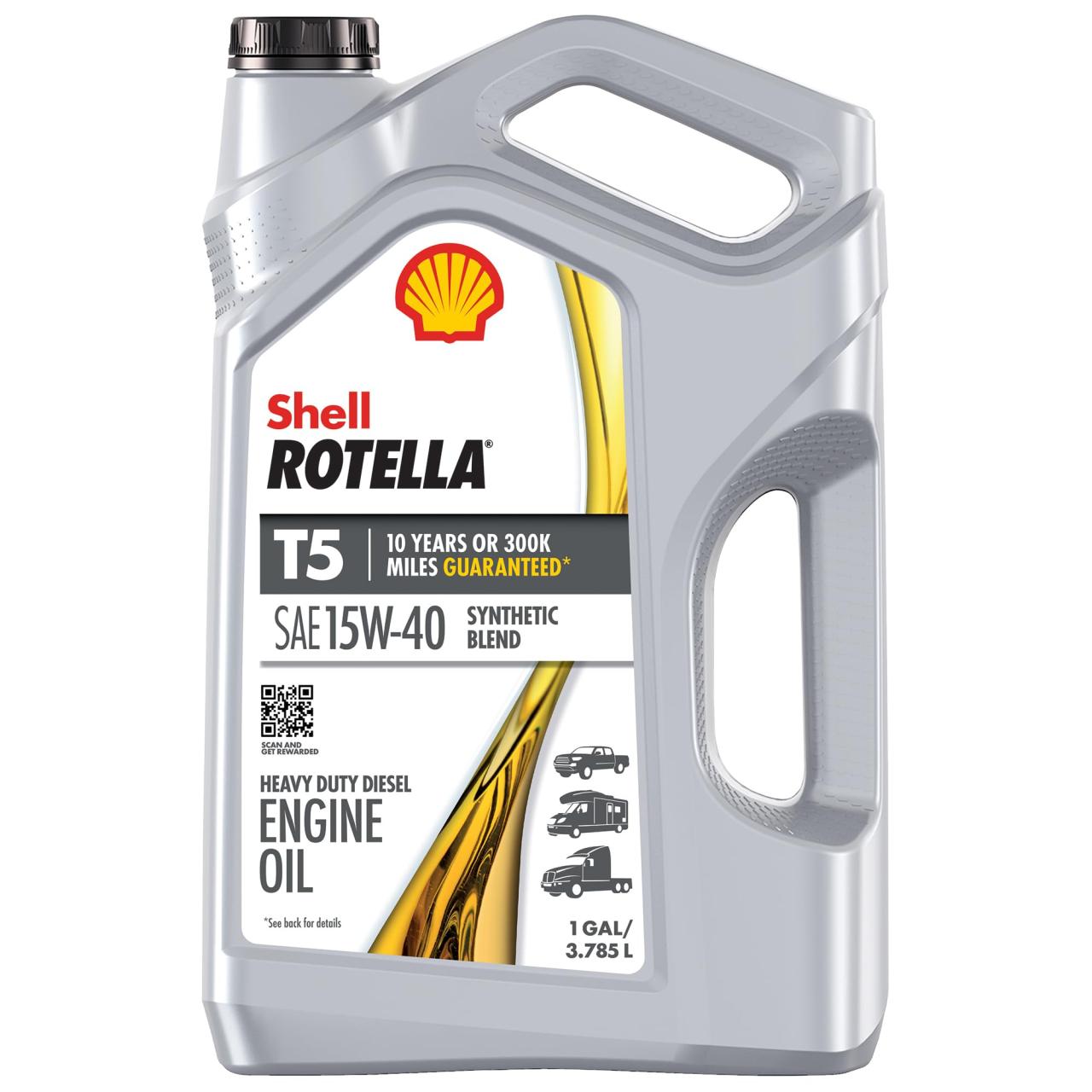
If you’re looking for a reliable and effective oil for your classic car, Shell Rotella T5 Synthetic Blend 15W-40 Diesel Engine Oil is an excellent choice.
Pros
- Provides excellent wear protection
- Controls engine deposits for reliability at extended oil drain intervals
- Improves low-temperature flow compared to conventional 15W-40 oils
Cons
- Some users have reported issues with packaging during shipping
- May not be suitable for some types of engines
- Some users may prefer a fully synthetic oil over a synthetic blend
We’ve had great experiences using Shell Rotella T5 Synthetic Blend 15W-40 Diesel Engine Oil in our classic cars. The oil provides excellent wear protection, which is essential for older engines that may be more prone to damage. We’ve also found that it helps control engine deposits, which is important for maintaining reliability over time. Additionally, the oil improves low-temperature flow, which is particularly useful during colder months.
While we’ve had mostly positive experiences with this oil, we have heard from some users who have reported issues with packaging during shipping. Additionally, this oil may not be suitable for all types of engines, so it’s important to check your owner’s manual before making a purchase. Finally, some users may prefer a fully synthetic oil over a synthetic blend, depending on their specific needs and preferences.
Overall, we highly recommend Shell Rotella T5 Synthetic Blend 15W-40 Diesel Engine Oil for anyone looking for a reliable and effective oil for their classic car.
Buying Guide
When it comes to choosing the best oil for your classic car, there are a few things to consider to ensure you’re getting the right product. Here are some factors to keep in mind:
Viscosity
One of the most important things to consider when choosing oil for a classic car is viscosity. Viscosity refers to how thick or thin the oil is, and it’s typically measured using the Society of Automotive Engineers (SAE) viscosity rating system. It’s important to choose an oil with the right viscosity for your car’s engine to ensure proper lubrication and protection.
Additives
Another factor to consider is the additives in the oil. Additives are chemicals added to the oil to enhance its performance and protect the engine. Some common additives include detergents, which help keep the engine clean, and anti-wear agents, which reduce friction and wear on engine parts.
Compatibility
It’s also important to choose an oil that’s compatible with your car’s engine. Some older engines may require a specific type of oil, so it’s important to consult your owner’s manual or a trusted mechanic to ensure you’re using the right product.
Quality
Finally, it’s important to choose a high-quality oil to ensure maximum protection and performance. Look for oils that meet industry standards and have been tested and approved by reputable organizations.
By considering these factors and doing your research, you can choose the best oil for your classic car and ensure it runs smoothly for years to come.
Frequently Asked Questions
What type of oil is recommended for high-mileage vintage vehicles?
For high-mileage vintage vehicles, we recommend using a high-quality conventional motor oil with a high viscosity rating. This type of oil is specifically designed to provide the necessary protection for older engines with worn seals and gaskets. Look for an oil that meets the API (American Petroleum Institute) SN rating, as well as the SAE (Society of Automotive Engineers) viscosity rating recommended by the vehicle manufacturer.
How does zinc content in motor oil benefit classic cars?
Zinc is an essential additive in motor oil that provides anti-wear protection to the engine’s moving parts. Classic car engines, particularly those built before the 1980s, were designed to run on motor oil with high levels of zinc. Using motor oil with low zinc content can cause accelerated engine wear and damage. Therefore, it is important to use motor oil with a higher zinc content specifically formulated for classic cars.
What are the pros and cons of using synthetic oil in vintage engines?
Synthetic oil offers several benefits over conventional motor oil, including improved engine protection, better fuel economy, and longer oil change intervals. However, synthetic oil may not be suitable for all vintage engines, particularly those with high mileage or worn seals and gaskets. The use of synthetic oil in these types of engines may cause oil leaks or other engine problems. It is always best to consult with a professional mechanic before switching to synthetic oil.
Is a thicker viscosity oil preferable for the engines of old cars?
In general, older engines with high mileage may benefit from using a slightly thicker viscosity oil. This is because older engines tend to have more wear and tear on their moving parts, which can cause oil to leak or burn off more quickly. However, using oil that is too thick can also cause engine damage. It is important to consult with a professional mechanic before changing the viscosity of your motor oil.
What are the best synthetic oils for preserving older engines?
There are several high-quality synthetic oils available on the market that are specifically formulated for preserving older engines. Look for oils that contain high levels of zinc and other anti-wear additives, as well as those that meet the API SN rating. Some popular brands include Royal Purple, Mobil 1, and Amsoil.
Which oil additives should be considered for older engine maintenance?
There are several oil additives available on the market that can help maintain and protect older engines. These include additives that improve engine performance, reduce engine wear, and prevent oil leaks. However, it is important to use caution when adding aftermarket additives to your motor oil, as some may not be compatible with certain engine types or may cause damage over time. It is always best to consult with a professional mechanic before adding any aftermarket additives to your motor oil.